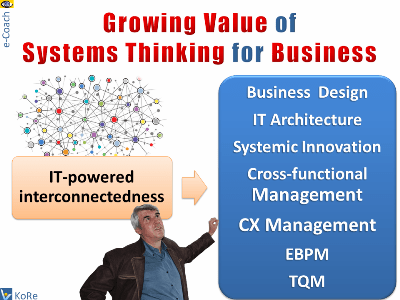| |
|
Process-managed Enterprise
Focusing on the whole business
system designing
high-performance ways of working
|
|
 |
| |
Process Enterprise vs.
Functional Enterprise
In
a functional company, no one has
overall responsibility for a
process. "Managers are
responsible only for a narrow
segment of a process. No one is
empowered to create or impose a
new process design, to knock
down barriers, and to make the
process work as it should... In
innumerable ways, traditional
organizations interfere with the
ability of their people to
perform process work," writes
Michael Hammer, the author of
Agenda.
A
process-managed enterprise
supports, empowers and energizes
employees, encourages their
initiative, enables and allows
its people to perform process
work.
|
|
9 Steps to
building a Process-managed
Enterprise
Process
Definition
Business
Process
Characteristics
Process
Thinking
Checklist
Leadership
Attitude |
|
|
|
|
"Process work is work that is
focused on the customer, work
that is directed toward
achieving results rather than
being an end in itself, work
that follows a disciplined and
repeatable design. Process work
is work that delivers the
high-level of performance that
customers now demand."
~
Michael Hammer
|
|
| |
Institutionalizing Success
The process approach rejects the
idea that the company's success
relies on luck, such as inspired
individuals or visionary
leaders, on the grounds that it
is unsustainable. Your cannot
control whether "lightning will
strike, or depend on it to
strike regularly. Process
companies seek to
institutionalize success by
designing high-performance ways
of working. They do not
denigrate the talents of
remarkable individuals, but they
recognize that all human talent
can and should be leveraged by
an overall process. They believe
that a company achieves its
highest potential by designing
processes that mobilize
everyone's abilities rather than
depending too much on any single
individual, however gifted she
or he may be," writes Michael
Hammer.
|
|
Winning
Organization
Systems
5 Basic
Elements
Team
Culture
10 Tips
for Building a Team Culture
Know Your
Enemies
9 Signs of
a Losing Organization
Barriers
to successful TQM
Break Silo |
|
|
|
|